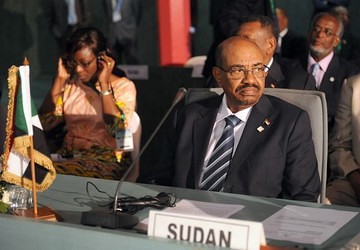
Sudan's President Omar al-Bashir takes part in the African Union Summit on health focusing on HIV/AIDS, TB and malaria in Abuja on July 15, 2013., a photo by Pan-African News Wire File Photos on Flickr.
‘Vaccine is best hope to end Aids’
October 8, 2013
Paidamoyo Chipunza in Barcelona, Spain
The world’s only scientific meeting dedicated exclusively to HIV vaccines research opened here yesterday with over 1 000 world leading researchers, funders and policymakers attending the four-day meeting. Addressing a Press conference at the International Convention Centre, director of the Global HIV Vaccine Enterprise Mr Bill Snow said a vaccine is the only hope to effectively end Aids.
“If you really want to solve the problem (of new infections) in a more efficient way, a vaccine is really the best bet; that is why we have so much hope in HIV vaccine research,” said Mr Snow.
He, however, said in the past 30 years, of the six studies conducted to establish the efficacy of proposed vaccine candidates only one study was successful.
That study, known as the RV 144, was conducted in Thailand and showed 31 percent protection against HIV infection.
“There is progress. There is a direction that seem good to go and there are also some new directions in terms of anti-body driven vaccines that seem to have taken our traditional approach and some amazing work is being done to solve that problem,” he said.
Addressing the same gathering, a representative of the community advisory board of Spain Ms Laia Ruiz Mingote emphasised the need for community engagement in research work to come up with absolute results.
Ms Mingote said the ultimate goal for researchers and communities is to end Aids.
“Science cannot work properly without community and as community as we cannot achieve our dreams without science,” said Ms Mingote.
She said Governments should channel more resources towards the research and development for HIV vaccines, and that researchers should also include communities in any decision-making process in relation to HIV vaccines. HIV continues to claim more lives as scientists battle to get a cure and a vaccine for the virus.
In Zimbabwe about 1,6 million people are estimated to be living with HIV with over 600 000 people on ARVs. Scientists here would deliberate during the next three days how they plan to halt new infections while waiting for a vaccine.
Prevention strategies which include use of microbicides for women, using antiretroviral drugs for treatment and male circumcision would be deliberated as possible options to reduce the risk of HIV.
According to Mr Anthony Fauci from the National Institutes of Health in the US, about 25 percent of Americans are on antiretroviral treatment and the virus is no longer detectable anymore.
He said basing on such revelations and building from that science, there is still hope that a vaccine could soon be found.
No comments:
Post a Comment